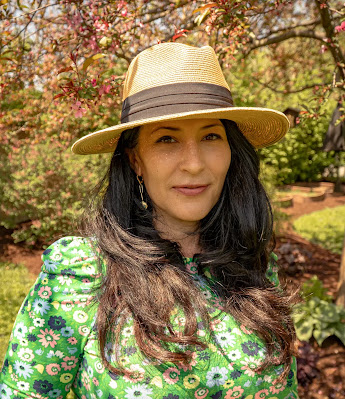Today's News . . . Today's Poem
The New Verse News
presents politically progressive poetry on current events and topical issues.
Sunday, July 31, 2022
THE GREAT PACIFIC GARBAGE PATCH
Saturday, July 30, 2022
WOMAN, WAKING
Friday, July 29, 2022
NO BAD DAYS AT THE FOOD PANTRY
 |
| The poet and colleague volunteer at the food pantry. |
Thursday, July 28, 2022
ALL PARENTS WANT THEIR KIDS' DREAMS TO COME TRUE
 |
| Foto Prensa Libre, July 17, 2022: Elmer Vargas |
Wednesday, July 27, 2022
SHARING THE ROAD
THE POLITICS OF FAITH AND CULTURE
THE SECRET SERVICE
 |
| Bill Bramhall | Copyright 2022 Tribune Content Agency |
Tuesday, July 26, 2022
UNDER FOSTER GRANTS
ON GRAND SLAM BREAKFASTS (AT DENNY’S) & FRESH OCTOBER HITS (AT BAT)
Monday, July 25, 2022
I DREAMED LAST NIGHT
THE WEST IS BURNING
by Steve Deutsch
On the rise above
Route 80, by a trickle
that was once
a river
I watch a line
of traffic
a thousand miles long
going nowhere.
The road has
buckled and a semi
sits on its side
steam still boiling.
One by one
the cars and trucks
run out of gas—
dream irony
I suppose,
and people stand
beside their behemoths—
afraid at last.
The pine
and hemlock forest
that lined the road
has turned
a sickly brown
and trees light up
like candlesticks
one by one.
Children fight
the fire
with blankets
and spit.
And the dust
and smoke
and ash
make breathing
an occupation.
The west is burning
and few if any
will make it out.
I wake with a gasp—
heart escaping.
Smoke colors the moon
the west is burning.
Steve Deutsch has been widely published both on line and in print. Steve is a three time Pushcart Prize nominee. He is poetry editor for Centered Magazine. His poetry books: Perhaps You Can (2019), Persistence of Memory (2020), and Going, Going, Gone (2021) were all published by Kelsay Press.
AMERICAN HAIKU: NEW NORMAL IS NORMAL AGAIN
Sunday, July 24, 2022
PERFECT PORTRAIT
Saturday, July 23, 2022
HEAT WAVE
Muffled staccato—
summer voices
too distant to be
understood—I try
not to stress the
circuitry mid-day—
douse the lights,
draw the shades.
A song from fifty
years ago plays on
my radio of memory
W. Luther Jett is a native of Montgomery County, Maryland and a retired special educator. His poetry has been published in numerous journals as well as several anthologies. He is the author of five poetry chapbooks: Not Quite: Poems Written in Search of My Father (Finishing Line Press, 2015), Our Situation (Prolific Press, 2018), Everyone Disappears (Finishing Line Press, 2020), Little Wars (Kelsay Books, 2021), and Watchman, What of the Night? (CW Books, 2022).
HEAT WAVE
Friday, July 22, 2022
WHEN THE AIR COULDN'T HOLD
Thursday, July 21, 2022
DRY SEASON
Wednesday, July 20, 2022
FIRE
A Poem for Ada Limón, using her words
by Pauletta Hansel
 |
| Ada Limón Is Named the Next Poet Laureate: Poetry, she said, can help the nation “become whole again” in a fraught, divided moment. Photo by Carla Ciuffo for The New York Times, July 12, 2022 |
Sometimes I imagine all my lovely poets
out there in the world of their bodies
having a poetry party
with dry red wine uncorked and pimento cheese
spread out on a warm lawn, or gathered
around the inside of a picture window,
still black water holding the stars,
talking poems made
in the white heat of the moment… or
written from inside the well ...
Reminding themselves that
when things are bad,
we still have our words
and each other.
And then I get on Facebook
and I see it really is true.
When the day calls for fire
and your friends have all the matches
to burn it down, Ada posts,
and I know these friends,
some of them anyway,
and the R.J Corman rail line
running by her house,
surrounded by wild things,
green trees, grasses.
But never mind my invitation
lost on the internet,
I’ll read myself in
between the lines—
“If you want to win anything—your race, your self, your life—
you have to go a little berserk”—this woman even gets good fortune cookies,
and on the radio now Ada Limón is talking
about female rage and how
sometimes we need
to step into that room and make ourselves
fully known and fully seen.
Even “The Onion” loves this woman, the railroad spike
bisecting Trump’s hypothalamus and he calls a meeting
to name her poet laureate.
When we name things we are more tender to them…
But I am also aware of the hubris of naming things.
She’s not my friend,
even though she seems to live inside my body,
more tired than I should be,
…hurting more,
my brain keeps saying
“this country hates women,
this country hates women”
And of course women are hesitant
about our subject matter.
Of course we are.
We’ve been taught that from the very beginning
to ask ourselves,
Should I take the “I” out? Should I erase my being?
But there she is, Ada Limón, singing the song
of our shared bones, and, yes,
sometimes the song
is enough.
Italicized lines are from the following sources:
Ada Limón's Facebook timeline, October 2018
https://soundcloud.com/
https://politics.theonion.com/
“The Poetry of Perseverance: An Interview with Ada Limón,” Poets & Writers September/October 2018.
The final lines reference “A New National Anthem,” The Carrying, by Ada Limon
Pauletta Hansel’s newest poetry collection is Heartbreak Tree, an exploration of the intersection of gender and place in Appalachia. Her writing is featured in Oxford American, Rattle, The New Verse News and Poetry Daily, among others. Pauletta was Cincinnati’s first Poet Laureate and is 2022 Writer-in-Residence for The Cincinnati and Hamilton County Public Library.
Tuesday, July 19, 2022
ANTHEM FOR DOOMED YOUTH
Monday, July 18, 2022
AS A TEN-YEAR-OLD OHIO GIRL
 |
| file photo… not the author |
Sunday, July 17, 2022
AMERICAN DREAM ‘22
 |
| The American Dream Art Print by cindy nguyen |
Saturday, July 16, 2022
THE NEW USA
Friday, July 15, 2022
TOO GRAPHIC
 |
| Above: screenshot of the video. |
Thursday, July 14, 2022
AFTER LISTENING TO THE JANUARY 6TH HEARINGS
After William Blake









